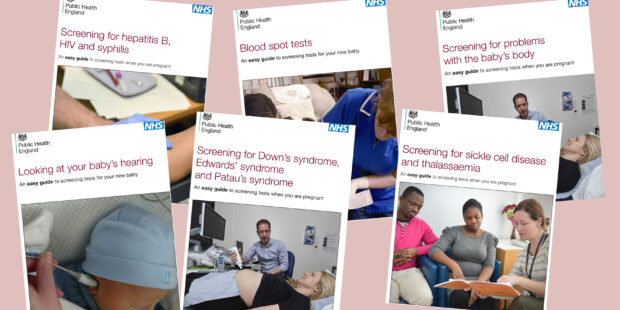In January 2018, you may have seen my blog launching a project to find out if the PHE Screening easy guides on antenatal and newborn screening meet the needs of pregnant women who have learning disabilities.

I’d like to say a big thank you to everyone across London and nationally who shared their experiences and opinions for this project.
Contributors included:
- antenatal and newborn screening providers
- maternity and learning disability professionals
- voluntary sector support and advocacy groups
- people with learning disabilities
I gathered comments on the easy guides and explored how information was passed on to pregnant women with learning disabilities.
Everyone agreed easy guides are a useful tool, but a common theme was that health and other services could make improvements.
Feedback from users of the guides
The Screening tests for you and your baby: easy guides explain the screening tests offered during and after pregnancy for people with learning disabilities. They were adapted from the Screening tests for you and your baby booklet following workshops held with experts and users to refine the content.
Feedback from health professionals suggested the easy guides are useful and have been well received. Parents who provided feedback said that the easy guides helped them understand antenatal and newborn screening.
Most people with learning disabilities needed some support to understand so the guides are not standalone resources, There is a need for professionals to use the easy guides to support a conversation, not replace it.
There were many suggestions, including improvements to terminology, photos and formatting, but overall the feedback was very positive. We'll make sure comments are incorporated into the easy guides when they are reviewed and updated.
A consistent theme from professionals and people with learning disabilities was that more videos would really help understanding.
One parent with a learning disability who took part in a focus group summed up this point:
It’s good, but have videos, then make it shorter and have simpler words.
Other issues
London maternity units say they see low numbers of women who have a formal diagnosis of learning disability. Many women who have a learning disability or who need additional support have not been diagnosed, for a variety of reasons.
Consistent feedback across London also suggests there is an overlap between learning disability and a variety of other issues, including safeguarding, mental health and migrant health.
There was variation in:
- awareness of the easy guides
- training and confidence in discussing with people with learning disabilities
- how services were set up
There was a general feeling that systems and services could do more to support women with learning disability through screening.
You can download the full report of my work.
Next steps
PHE Screening hopes to talk to NHS.UK colleagues about creating accessible video content on antenatal and newborn screening for people with learning disabilities. In addition, we will produce guidance for professionals on GOV.UK on how best to support women.
Please continue to share the guides with colleagues. We will also continue to share the findings of this evaluation to further engage professionals and their organisations in thinking about improvement services.
Please get in touch with us if you make improvements to your local screening services for women with learning disabilities informed by this report. We’d love to hear what you’re doing and share your good ideas with other providers through this blog.
PHE Screening blogs
PHE Screening blogs provide up to date news from all NHS screening programmes. You can register to receive updates direct to your inbox, so there’s no need to keep checking for new blogs.
1 comment
Comment by Irene Stratton posted on
Lots of the information in the report would be useful to other screening programmes.
A colleague who has worked on information leaflets in other areas of the NHS said that leaflets designed for people with learning disabilities should be used for everyone - not just those identified as having learning disabilities. Even those with high levels of education seem not to be offended by having a simple leaflet.